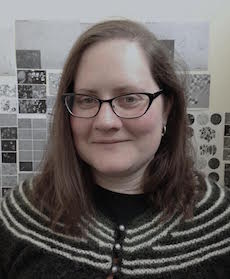ISU graduate Monica Tromp credits CPI program in helping land spot at Max Planck Institute in Jena, Germany
October 4, 2016
POCATELLO – Idaho State University graduate Monica Tromp began post-doctoral work at the Max Planck Institute for the Science of Human History, located in Jena, Germany, this fall.
 According to Tromp, her training at ISU as a Career Path Intern (CPI) under Associate Professor of archaeology John Dudgeon was invaluable to helping her attain this position.
According to Tromp, her training at ISU as a Career Path Intern (CPI) under Associate Professor of archaeology John Dudgeon was invaluable to helping her attain this position.
Dudgeon is the director of ISU’s Center for Archaeology, Materials and Spectroscopy (CAMAS) where Tromp was employed.
For her post-doctoral work, Tromp will examine human dental calculus, or calcified plaque, from Southeast Asia, Indonesia, and Oceania using proteomic, genomic, and microfossil techniques.
“The aim of my project is to explore the influences of Southeast Asia and Indonesia to the Austronesian expansion that is thought to have started in Taiwan approximately 5,000 years ago and eventually moved into the Pacific by about 3,500 years ago,” Tromp said.“The influences of mainland Southeast Asia have been seen in the ancient DNA analysis of the pigs and dogs that were brought into the Pacific, but the influences the people themselves had remains unclear,” Tromp added.Calcified plaque contains numerous micro-particles that can inform us on the everyday lives of people in the past including their diets, health and disease, and even their ancestry, Tromp said.
“My main focus will be examining the plant components of their diets, which will help us understand how plant resources were moved around the region,” Tromp said. “This builds on work I started as a bachelor’s student and continued during my master’s with John Dudgeon at ISU and then my Ph.D. at the University of Otago in New Zealand,” Tromp continued.Tromp said that her work as a CPI at ISU undoubtedly put her ahead of other applicants for both her Ph.D. and post-doctoral training.
In addition to working on her own projects, Tromp was employed as a laboratory technician at CAMAS and the Ancient DNA Extraction Laboratory (ADEL) as both an undergraduate and graduate student, which gave her the opportunity to work on projects across several disciplines.
“The hands-on training from John that eventually enabled me to perform maintenance and upkeep of the equipment at CAMAS and the development of protocols for ADEL has been a huge asset – this is not something most students get the opportunity to do,” Tromp said.
Tromp said that understanding how the lab equipment functions enables researchers to understand both the possibilities and limitations of different techniques, which is vital when writing proposals and examining their feasibility.
“John was, without question, the most supportive and inspiring supervisor I had during my time as a student,” Tromp said. “Without his expert guidance in both the technical and philosophical aspects of archeological science, I would not be where I am today.”
Categories:
